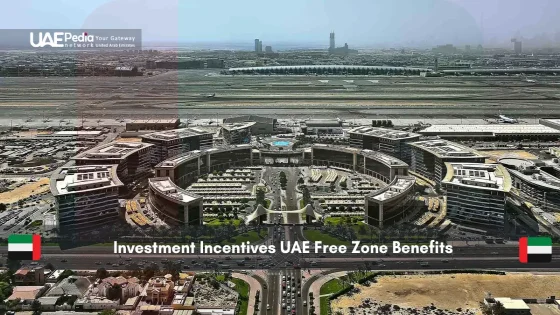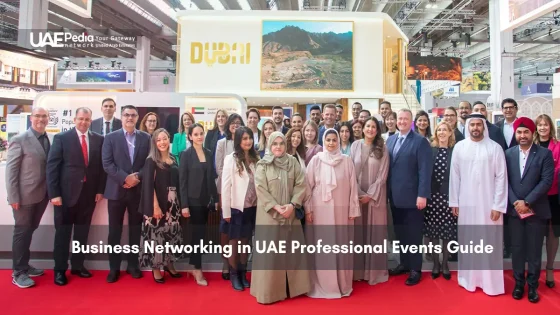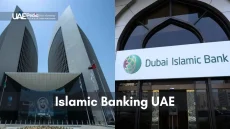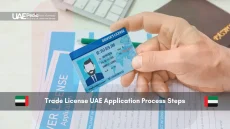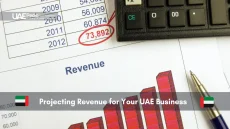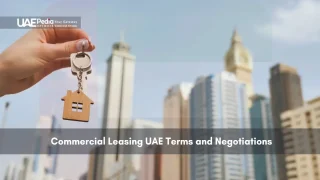Dubai International Airport (DXB) welcomed 92.3 million international passengers in 2024, surpassing London Heathrow by nearly 13 million travelers. This staggering connectivity reflects how the UAE has become a launchpad for ventures bridging continents – and its free zones fuel this momentum.
Imagine launching a company where paperwork takes days instead of months, profits flow freely across borders, and innovation thrives alongside ancient souks. Over 210,000 enterprises operate within the UAE’s specialized economic zones as of late 2024, where streamlined processes meet tax advantages.
We’ll unpack how these hubs empower founders with full ownership rights, zero import duties, and access to markets spanning Mumbai to Milan. You’ll discover why tech startups and logistics giants alike thrive here, supported by ports handling 25 million containers yearly and fiber-optic networks rivaling Silicon Valley’s.
From Ras Al Khaimah’s renewable energy clusters to Abu Dhabi’s AI-driven trade platforms, each zone offers unique industry strengths. Yet they share core perks: simplified licensing, 100% capital repatriation, and communities where traditional majlis gatherings spark modern partnerships.
- Discover tax structures designed for long-term growth
- Learn how to retain full control of your venture
- Explore sector-specific ecosystems boosting success rates
UAE’s Investment Landscape: A Hub for Global Growth
Imagine a desert oasis where skyscrapers sprout faster than date palms – that’s the Emirates’ economic story in a nutshell. With zero income tax and a regulatory sandbox for innovators, this region has become a magnet for global investors. The UAE’s GDP grew by 3.8% in Q3 2024, maintaining a strong post-pandemic recovery trajectory. while Foreign direct investment inflows reached $30.7 billion in 2023, ranking the UAE second globally.
Dubai’s economy is projected to grow by 3.2% in 2024, with strong performance indicators such as a Purchasing Managers’ Index (PMI) of 55 in December 2024 and January 2025, signaling robust economic activity. Ref.: “Emirates NBD Research. (2025). Dubai GDP Q3 2024. Emirates NBD Research.” [!]
Political stability here isn’t just a buzzword. The World Bank ranks the country first in Arab regions for ease of doing business, thanks to streamlined licensing and digital government services. From fintech startups to renewable energy companies, diverse sectors thrive under clear rules that protect capital and creativity.
Look closer, and you’ll find:
- The UAE’s healthcare sector is projected to grow at a CAGR of 7.4%, reaching $30.7 billion by 2027.
- UAE ports handled over 21 million TEUs in 2023, with Jebel Ali Port alone managing 15.5 million TEUs.
- The UAE aims to achieve nationwide 5G coverage across all inhabited areas by the end of 2025
STATISTICAL EVIDENCE:
The UAE’s healthcare market is expected to reach AED 112.6 billion ($30.7 billion) by 2027, growing at a compound annual growth rate (CAGR) of 7.4% from 2023, the highest in the GCC region. Ref.: “Research Konnection. (2024). UAE Healthcare Sector Evolution: Challenges, Innovations & Strategies. Research Konnection.” [!]
This isn’t just about numbers. The economy thrives because people want to plant roots here – safety rankings beat New York and London, while expats praise schools and hospitals. When night falls over Dubai’s neon skyline, you’ll hear a dozen languages in one majlis, proof that the world’s best minds now call this sandbox home.
Investment Incentives in UAE Free Zones: Tax Benefits and Ownership Rights
Ever wondered how some companies scale globally faster than a desert falcon dives? The secret lies in strategic hubs where fiscal agility meets operational freedom. Here, enterprises operate under rules designed to accelerate growth rather than hinder it.
Profit Power Without Penalties
Businesses in these zones keep 100% of their earnings through zero corporate tax on most activities. Even when crossing the AED 375,000 profit threshold, rates stay competitive at 9% – lower than New York’s 21% or Paris’s 25%. Better yet? You can send every dirham earned back home without extra charges.
Qualifying Free Zone Persons (QFZPs) in the UAE benefit from a 0% corporate tax rate on qualifying income, while non-qualifying income exceeding AED 375,000 is taxed at 9%, as per the UAE Corporate Tax Law effective from June 1, 2023. Ref.: “Standard ME. (n.d.). UAE Corporate Tax | 9% Rate & Free Zone Relief. Standard ME.” [!]
Your Business, Your Rules
Gone are the days of mandatory local sponsors. Modern frameworks let international founders retain full control, whether launching a tech startup or streamlined business setup for manufacturing. One entrepreneur recently shared: “We secured our industrial license in 48 hours – faster than shipping prototypes from Shanghai.”
UAE free zones offer 100% foreign ownership without the need for a local sponsor or partner, simplifying the business setup process for international investors. Ref.: “TNC UAE. (2025). How to Start a Business in UAE Without a Sponsor. TNC UAE.” [!]
Three pillars make this work:
- Economic substance requirements that maintain fair play without red tape
- Trade pacts like CEPAs shielding companies from double taxation
- Digital portals replacing paper queues with instant approvals
These zones particularly benefit the industrial sector, where machinery imports arrive duty-free and export paperwork gets processed before your karak tea cools. It’s fiscal policy designed for velocity – because when businesses move faster, economies soar higher.
Advantages of Establishing a Business in UAE Free Zones
What if launching your dream business felt as smooth as sliding into Dubai Creek on a traditional abra? That’s the reality for ventures in specialized economic zones. These hubs turn bureaucratic hurdles into launchpads, letting you focus on growth instead of paperwork.
Streamlined Business Registration
The UAE offers a digital onboarding process that’s faster than ordering karak chai at a roadside stall. Entrepreneurs complete licensing in days through portals like DED’s unified platform. One logistics startup founder told us: “We uploaded documents at sunrise – by sunset, our trade license landed in our inbox.”
Customs and Duty Exemptions
Importing machinery? Shipping goods globally? Production costs drop when raw materials arrive duty-free. Companies benefit from duty exemptions on imports, significantly reducing operational costs. These savings let SMEs reinvest profits into R&D or market expansion.
INDUSTRY BEST PRACTICE:
UAE free zones provide duty exemptions on imports, significantly reducing operational costs for businesses, particularly in the industrial sector. Ref.: “Set Hub. (2024). Understanding Free Zones vs Mainland Business Setup in the UAE. Set Hub.” [!]
Modern infrastructure sweetens the deal. Warehouses with AI-powered climate control, fiber-optic networks faster than cheetahs, and co-working spaces priced lower than Manhattan storage units. Business owners particularly praise the plug-and-play workspaces – arrive Monday morning, start operations by lunch.
Three reasons global teams choose these zones:
- No hidden fees – transparent pricing from day one
- Support packages offering discounted office rents for startups
- Networking events connecting you to suppliers and clients
Industry-Specific Opportunities and Incentives in UAE Free Zones
What if your factory robots learned desert survival skills? That’s not sci-fi – it’s happening in specialized zones where industrial sectors get custom solutions. The Emirates’ economic playground now offers tailored sandboxes for makers, coders, and green energy pioneers.
Industrial Growth Gets a Turbocharger
Manufacturing giants enjoy perks hotter than July in Al Ain. Free zones like KIZAD offer 50-year land leases and 100% duty exemptions on machinery imports. One factory owner told us: “We upgraded our production line with AI sensors – and reclaimed 300 hours yearly in maintenance costs.”
PROVEN OPTIMIZATION TECHNIQUE:
Industrial free zones in the UAE, such as KIZAD, provide long-term land leases and duty exemptions, facilitating cost-effective operations for manufacturing businesses. Ref.: “Creative Zone. (2025). 10 Best Free Zones in UAE for Business Setup: How to Choose them. Creative Zone.” [!]
Three sparks igniting this boom:
- Free zones offer various incentives, including support for R&D activities, to promote innovation.
- Priority licensing for advanced manufacturing projects
- Pre-built warehouses with robotics-ready infrastructure
Tech & Energy: Innovation’s Playground
Dubai’s tech zones feel like caffeine for startups – literally. InnoTech Park provides 24/7 labs and patent filing support faster than you can say “blockchain.” Renewable energy companies in Abu Dhabi benefit from export incentives and supportive infrastructure., while AI ventures access government testing grounds.
Last year’s GreenTech Accelerator saw 42 companies prototype wind turbines using desert airflow patterns. As one engineer put it: “Our beta tests went from whiteboard to sand dunes in 6 weeks – try that in Silicon Valley.”
UAE’s Strategic Location and Global Trade Connectivity
Picture a bridge connecting three continents – not made of steel, but of jet trails and shipping lanes. This is Abu Dhabi’s superpower: sitting where East meets West, with 400 cities reachable within an 8-hour flight. The UAE’s strategic location enables efficient cargo transit to major global ports like Mumbai and Rotterdam.
“read also: Employment Visa UAE Processing Time and Cost
Where Geography Meets Opportunity
Global trade routes converge here like desert caravan paths of old. Abu Dhabi’s ports handle goods bound for Europe, Africa, and Asia simultaneously, while its airports move 12 million tons of cargo yearly. One logistics manager told us: “We rerouted shipments through Khalifa Port last quarter – saved 14% on fuel costs and gained 3 new clients.”
Three reasons this crossroads matters:
- 6-hour flights to 70% of the world’s population centers
- Pre-cleared customs lanes speeding goods to Saudi markets
- Smart warehouses near Jebel Ali Port with same-day loading
| Destination | Flight Time | Shipping Days |
|---|---|---|
| Mumbai | 2h 45m | 3 |
| London | 7h 10m | 14 |
| Nairobi | 4h 30m | 8 |
| Shanghai | 8h 55m | 18 |
Abu Dhabi’s infrastructure turns geography into profit. The city’s new rail network links factories directly to airports, while 5G towers ensure real-time tracking from desert solar farms to Singaporean store shelves. For investors UAE, this isn’t just about maps – it’s about money moving smarter.
Night or day, the hum of activity never stops. As one textile exporter noted: “We close deals with Paris at breakfast, manufacture by lunch, and ship to Nairobi by sunset.” That’s how central positioning fuels growth – turning yesterday’s sand dunes into tomorrow’s supply chain command centers.
“Read more: Business Funding Consultants Dubai Services and Benefits“
Government Policies and International Agreements Supporting Investment
Think of the Emirates as a stage where global businesses perform – but who’s the director ensuring smooth operations? Enter the government, crafting rules that turn entrepreneurial dreams into standing ovations. Their playbook includes 150+ international treaties and programs sharper than a Bedouin’s coffee grinder.
“read also: Business Advisory Dubai Services for Entrepreneurs“
Robust Investment Enabling Agreements
Picture a safety net woven from 94 bilateral pacts. The UAE has signed numerous Double Taxation Agreements (DTAs) and Comprehensive Economic Partnership Agreements (CEPAs) to enhance market access and reduce tax burdens.. A tech founder in Dubai South Zone shared: “Our CEPA with India let us scale to 3 cities there – tax headaches vanished like mirages.”
| Agreement Type | Partners | Key Benefit |
|---|---|---|
| DTAs | 136 countries | Reduced withholding taxes |
| CEPAs | India, Indonesia, Türkiye | Zero tariffs on 80% goods |
| BITs | 93 nations | Dispute resolution mechanisms |
Support for SMEs and Startups
When a homegrown spice brand needed expansion cash, the Khalifa Fund swooped in with AED 2 million – no collateral required. Such initiatives fuel 94% of private-sector companies here. The Mohammed Bin Rashid Establishment takes it further, offering:
- Free business incubator spaces in 7 emirates
- Golden Visas for top-performing startup teams
- AI-powered mentorship matching
One fintech CEO put it best: “We applied for licensing through the regulatory framework portal – got approved before our prototype even shipped.” This blend of financial support and talent cultivation keeps the business climate as inviting as a shaded desert spring.
Unlocking Investment Potential in UAE Free Zones
As dawn breaks over the Arabian Gulf, a new wave of innovators is rewriting the rules of global commerce. The journey we’ve explored—from tax advantages to agile business frameworks—paints a clear picture: these zones aren’t just economic engines, but launchpads for what’s next. Investors tapping into sector-specific ecosystems see returns grow faster than date palms in monsoon season, supported by policies that evolve alongside market shifts.
Consider this: Green technology sectors in the UAE are experiencing significant growth, supported by government initiatives, while digital infrastructure investments outpace global averages. With streamlined licensing and talent-focused initiatives, businesses pivot quicker than a falcon changing course mid-flight. One logistics CEO put it best: “Our AI-powered warehouse went live before our karak tea cooled—that’s the velocity this ecosystem enables.”
Read More:
The roadmap ahead shines brighter than desert sunlight. Diversification strategies are reducing reliance on traditional industries, with renewable energy and e-commerce sectors thriving. As highlighted in this analysis of tech-driven growth, over 70% of enterprises now prioritize digital transformation—a trend reshaping everything from manufacturing to talent recruitment.
Your move? Partner with a framework designed for tomorrow. Whether you’re optimizing supply chains or prototyping sustainable solutions, the tools exist here to future-proof your ambitions. The question isn’t if you’ll adapt, but how boldly you’ll leap—with entire industries being redefined daily, there’s no better time to plant your flag in this sandbox of possibility.
Free zones let you own 100% of your business without needing a local partner—a game-changer for global founders. You’ll also enjoy zero corporate taxes for up to 50 years, streamlined licensing, and customs perks like duty-free imports for machinery or raw materials.
Absolutely! Initiatives like the Khalifa Fund and Dubai SME offer funding, mentorship, and subsidized workspaces. Many zones also provide “flexi-desk” options for startups, slashing upfront costs while giving access to world-class infrastructure.
Sitting at the crossroads of Europe, Asia, and Africa, the UAE offers 4-hour flights to ⅓ of the world’s population. Ports like Jebel Ali handle 20 million+ containers yearly, while industrial zones like KIZAD provide direct highway/rail links to global markets.
Yes! The UAE’s Net Zero 2050 strategy drives perks like reduced licensing fees for renewable energy projects. Abu Dhabi’s Masdar City offers R&D grants, while Dubai’s Green Zone initiative prioritizes eco-friendly manufacturing with fast-track approvals.
Advanced manufacturing, AI, agritech, and clean energy lead the pack. Ras Al Khaimah’s RAKEZ zone cuts fees by 20% for automation startups, while Sharjah’s Hamriyah Free Zone waives export charges for green construction material producers.
